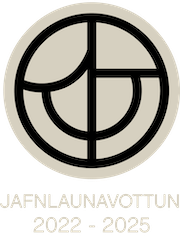Notkun kerfiserfðafræðinnar við greiningu á orsökum æðakölkunar og tengdra áhættuþátta - verkefni lokið
Fréttatilkynning verkefnisstjóra
Studies over many decades have shown that circulating factors are critical for age-related disease processes and complications, however for technical reasons a comprehensive analysis of the serum proteome has remained largely unexplored.
To this end the levels of 4,137 proteins covering the majority of predicted extracellular proteins, were measured in the serum of 5,492 subjects of the well characterized AGES Reykjavik cohort. Based on the criterion of pair-wise correlation between proteins using variation across individuals, the serum proteins formed functionally distinct network modules, many of which were associated to coronary heart disease (CHD). The protein modules were shown to be controlled by strong cis and trans acting genetic variants which in many cases were also associated with complex disease like CHD. This work reveals a previously unrecognized depth of co-regulation of circulating proteins, incorporating regulatory control between most or all tissues and demonstrating close relationships to past, current and future disease states. As such, coordinated variance of many understudied serum proteins may offer unrecognized opportunities for target and biomarker identification in human disease.
Information on how the results will be applied
The strong association of individual proteins and networks to disease states indicates that the serum proteome may be a rich and accessible setting to mine for biomarkers of disease and disease responses that integrate information from most if not all tissues in a global regulatory network. Scientists at the Icelandic Heart Association are writing patent applications to protect diagnostic-related inventions based on the proteins and patient stratified data.
A list of the project’s outputs
A paper entitled "Serum protein networks in humans link genetics to disease" has been written by Emilsson V. et al. which is currently under second review at the journal Science. A number of other papers based on the serum proteomics data will be submitted to scientific journals this year.
In Icelandic
Rannsóknir hafa sýnt fram á að blóðrásarþættir eru mikilvægir fyrir aldurstengda sjúkdóma og fylgikvilla þeirra, en af tæknilegum ástæðum hefur heildargreining á próteinum í sermi hins vegar verið að mestu leyti óþekkt hingað til. Til þess að bæta úr þessu höfum við beitt nýlegri tækni til að mæla 4.137 prótein, eða meirihluta spáðra utanfrumupróteina, mældum í sermi 5.492 einstaklinga úr AGES Reykjavik þýðinu. Með hliðsjón af viðmiðuninni um fylgni milli próteina sem endurspegla breytileika á milli einstaklinga í þýðinu, mynduðu sermispróteinin marga ólíka klasa, og af þeim voru klasar sem tengdust kransæðasjúkdómum og fylgikvillum þeirra. Sýnt var fram á að samsetning próteinklasanna var stjórnað af sterkum cis og trans virkum erfðabreytileikum sem í mörgum tilfellum voru einnig tengdir flóknum sjúkdómum eins og CHD. Þessi rannsókn sýnir áður óþekkt samband milli próteinanna í blóðrásinni, þar sem klasarnir endurspegla samtal milli ólíkra vefja líkamans, og geta spáð fyrir um þróun sjúkdóma eins og CHD. Þannig hafa skapast einstök tækifæri til að auðkenna ný lífmerki og lyfjaskotmörk fyrir algenga sjúkdóma.
Heiti verkefnis: Notkun kerfiserfðafræðinnar við greiningu á orsökum æðakölkunar og tengdra áhættuþátta
Verkefnisstjóri: Vilmundur Guðnason, Hjartavernd
Tegund styrks: Verkefnisstyrkur
Styrktímabil: 2014-2016
Fjárhæð styrks: 23,595 millj. kr. alls
Tilvísunarnúmer Rannís: 141101


